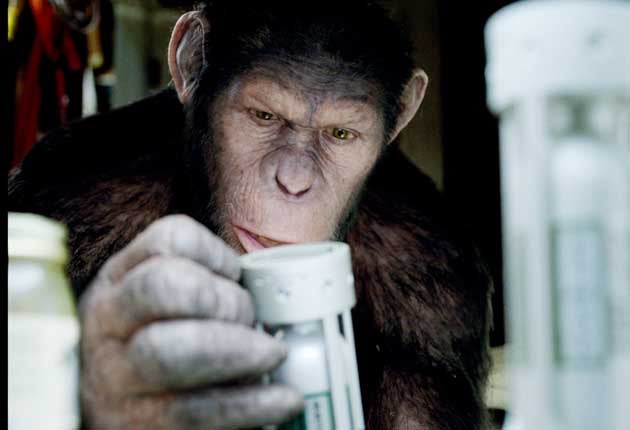Rise of the Planet of the Apes, Rupert Wyatt, 105 mins (12A)<br/>Project Nim, James Marsh, 93 mins (12A)
In a nimble prequel to 'The Planet of the Apes', the monkeys gain the upper hand – unlike poor Nim the chimp

James Franco is one of the most likeable actors in Hollywood, and one of the most versatile: he writes, he models, he paints, he makes music.
But I have found something that Franco absolutely cannot do, and that is convincingly portray a scientific genius. Hipster poets and genial drug dealers, maybe. But a Nobel Prize-worthy chemist? Not so much. In Rise of the Planet of the Apes, his character Will Rodman is the creator of an Alzheimer's cure: a brain-rebuilding drug that his Big Pharma firm has unwisely chosen to test on chimps. Franco, Freida Pinto (as Will's girlfriend) and David Oyelowo (as Will's boss) are all either miscast, or insufficiently charismatic to transcend the generic dialogue they're given. Of the humans on screen, only John Lithgow gives a memorable performance, as Will's father, suffering from a cinematic approximation of the disease.
But if you came for the humans, then you came to the wrong movie. It's not mere film critic hyperbole to say that the performing monkeys – sorry, apes – in Rise... wipe the animal enclosure floor with their human counterparts. Their personalities are more fully realised, their predicament far more moving and, despite their lack of a serviceable human larynx, they get all the best "lines". Our hero is not Will, but Caesar, a chimp who starts life smuggled from the lab after Jacobs (Oyelowo) orders a brutal cull of his company's primate test subjects. Thanks to the aforementioned wonder drug, Caesar is a prodigy; he grows up in the Rodman household more as a brother than a pet. Yet when, as a moody teen, he attacks an unfriendly neighbour, he's banged up in ape borstal. Caesar's incarceration, and the film's middle act, is played as a prison thriller. It's not my place to reveal what happens next, but given the glaring plot spoiler in the title, you can probably guess.
This is a prequel to the original 1968 Planet of the Apes (wisely ignoring Tim Burton's 2001 reboot); in place of Roddy McDowall, however, we now have Andy Serkis, the world's pre-eminent motion-capture actor. Serkis was the man behind King Kong and Gollum, and Caesar is, by some margin, his most compelling CGI turn yet. Rise... is another great leap forward for Weta, Peter Jackson's New Zealand-based digital effects house, which has created not just one sympathetic character but a cast of CGI primates with utterly convincing, dialogue-free relationships. That strikes me as a remarkable achievement.
Rise... is a propaganda gift for the animal rights lobby, so much so that it manages to thrill with the possibility of our own species' destruction. Project Nim occasionally achieves the same feat. A documentary built on interviews and archive material – by James Marsh, director of the Oscar-winning Man on Wire – its glaring similarities to Rise... can hardly be coincidental.
Nim, like Caesar, was a chimp with a traumatic history. Born in a primate research facility in Oklahoma in 1973, he was forcibly separated from his mother (who had already lost six newborns to scientific research) at just a few days old. He was destined for New York, where Herb Terrace, a psychology professor at Columbia University, wanted to learn whether chimps could be taught to construct human sentences using sign language. He named the ape Nim Chimpsky, after the distinguished linguist (and famed pessimist) Noam Chomsky.
Nim's early life was pampered but peripatetic. At first, he lived with rich hippie Stephanie LaFarge, who breastfed the baby ape as she had her own children, raising him as part of the family. But her approach to chimp-rearing was too unscientific for Terrace, who moved Nim to a 28-acre estate on the city's outskirts, to be schooled by a handful of eager young students. Nim quickly developed an impressive sign language vocabulary. But, like Caesar, he became a sulky teenager, and as he grew, his occasional attacks on his carers became more dangerous. Finally, Terrace called off the experiment and sent his subject back to Oklahoma. What followed was unbearably sad: the Oklahoma facility bore a spooky resemblance to Caesar's prison and, as if that weren't bad enough, Nim briefly ended up as a test subject for experimental medicines.
If there's a villain of the piece, then it's surely the manipulative Terrace, who flaunted his self-serving relationship with Nim to the media, and indulged his influence by sleeping with his students. Later, he decided the research had been useless, and that Nim was nothing more than an expert "beggar", who formed words to win food or fun. Well, aren't we all? If there's a human hero, meanwhile, it's Bob Ingersoll, a pot-smoking handler from the Oklahoma facility, and apparently one of the few people to really give a monkey's – sorry, "ape's" – about Nim's fate.
Ingersoll befriended the chimp and campaigned to have him liberated from the scientists. Thanks to his efforts, Nim's final years were lived in relative peace and contentment, among other chimps at an animal sanctuary. Still, this remains a melancholy film that shares with Rise... a grim assessment of the prospects for inter-species multiculturalism. If you're human (or if you share, say, 94 per cent of human DNA), it will break your heart.
Next Week:
Jonathan Romney inspects The Guard
Subscribe to Independent Premium to bookmark this article
Want to bookmark your favourite articles and stories to read or reference later? Start your Independent Premium subscription today.

Join our commenting forum
Join thought-provoking conversations, follow other Independent readers and see their replies